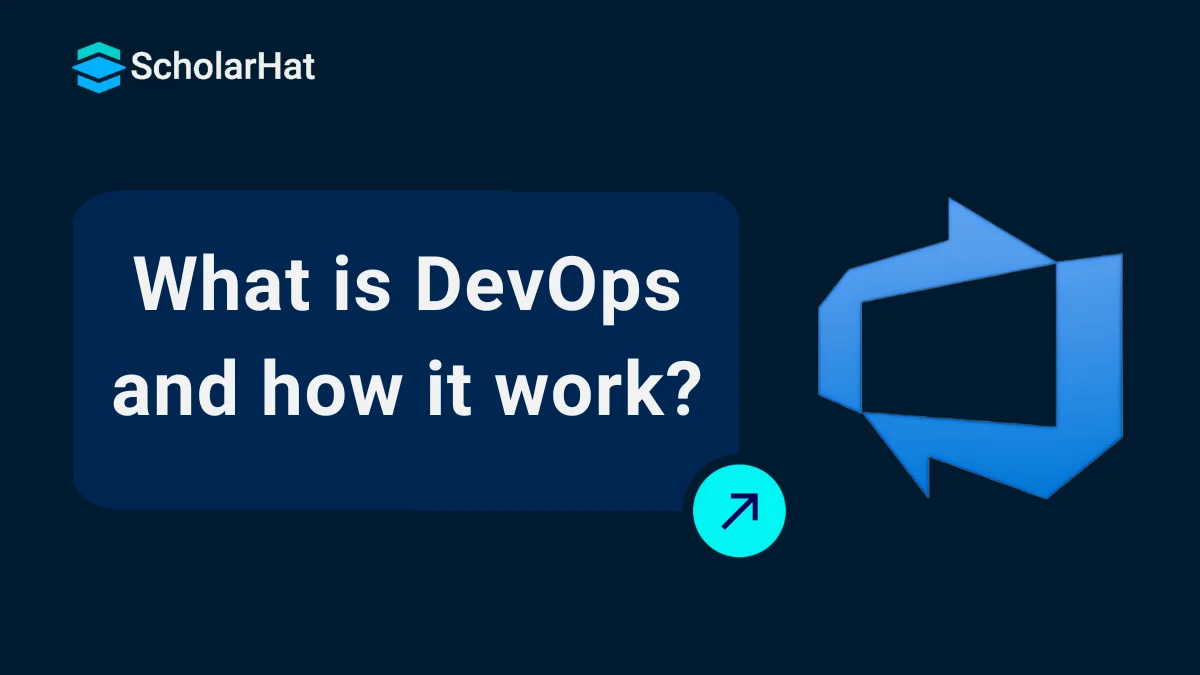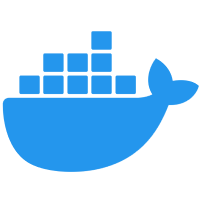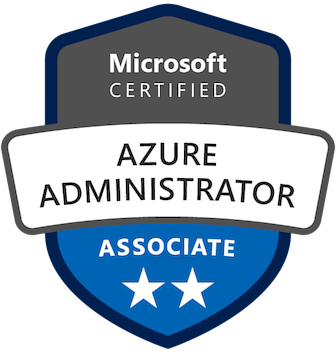30
DecWhat is DevOps and how it work?
DevOps is a set of practices that aims to shorten the development lifecycle and provide continuous delivery by encouraging collaboration between development and operations teams. In traditional software development, once developers finished writing the code, it often took a long time to get that code deployed or live on servers. This delay caused frustration and blame between the development team and the operations (or deployment) team.You might have heard common arguments like:

- Developers say: “It works fine on our system!”
- Operations reply: “It’s not the server, it’s your code!”
These back-and-forth issues created a lot of confusion and wasted time.DevOps solves this problem by encouraging both teams to work together from the beginning. It breaks down the wall between development and operations, leading to faster, smoother, and more reliable software delivery.
Let's see how? In this DevOps Tutorial, we will explore more about What is DevOps?, How DevOps Works?, DevOps Advantages and Disadvantages, and much more.
What is DevOps?
- DevOps is Development and operations. It’s a Union of processes, People, and Working products that enable continuous integration and continuous delivery of value to our end users.
- DevOps accelerates the process to deliver applications and software services at high speed and high velocity.
- So that organizations can learn and adapt to the market at its earliest.
- Also, it minimizes the risk factor by continuously delivering and getting end-users' and stakeholders' feedback at the early stages.
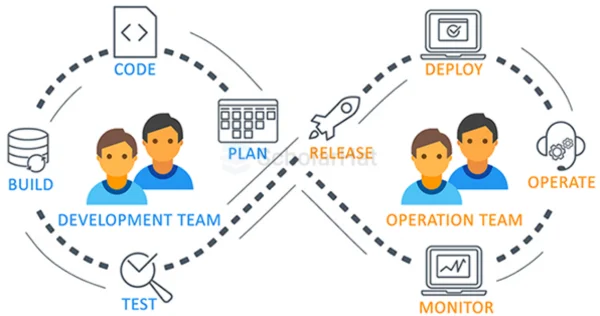
DevOps Lifecycle – Step-by-Step
1. Planning & Analysis
- Begin by analyzing business requirements.
- Plan and define the software architecture and codebase.
2. Development (Dev)
- Developers write the code for new features or updates.
- Version control and collaboration tools are used.
3. Build
- Code is compiled and packaged into deployable units.
- Automated build systems help ensure consistency.
4. Testing
- Automated tests (unit, integration, etc.) are run to find bugs early.
- Ensures software quality before deployment.
5. Release
- The product is prepared for deployment.
- Release pipelines are set up for smooth delivery.
6. Deployment (Ops)
- Code is deployed to staging or production environments.
- Continuous Deployment or Delivery pipelines may be used.
9. Operations
- The application is managed, scaled, and maintained.
- Infrastructure monitoring and incident management are handled here.
10. Monitoring & Feedback
- Performance and user behavior are continuously monitored.
- Logs and analytics provide real-time insights.
11. Continuous Feedback Loop
- Feedback from users and systems flows back to developers.
- Leads to improvements, bug fixes, or new feature planning.
12. Repeat the Cycle
- The process repeats with updates based on business needs.
- Enables rapid and continuous delivery of valuable software.
Why DevOps?
DevOps is essential because it bridges the gap between development and operations, helping organizations deliver software faster, more reliably, and with fewer errors. In today’s competitive software Industry, Automation and AI play a major role, and to stay ahead in the market and attract your stakeholders and customers, we must transform and adapt the DevOps Best Practices. So why do you need DevOps in the First place? Well below are the reasons:
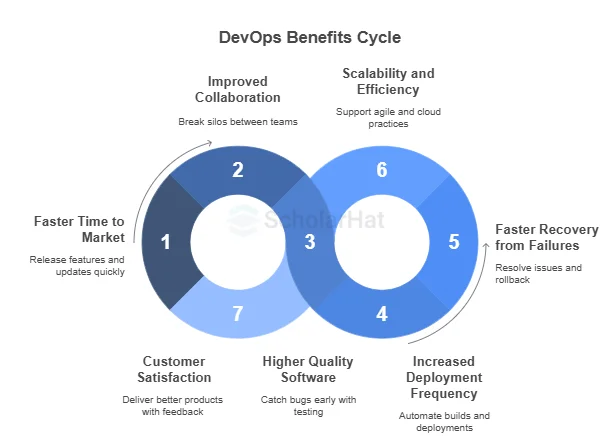
- Faster time to market – Quickly release features and updates
- Improved collaboration – Breaks silos between development and operations
- Higher quality software – Continuous testing and integration catch bugs early
- Increased deployment frequency – Automate builds, tests, and deployments
- Faster recovery from failures – Quick rollback and issue resolution
- Scalability and efficiency – Supports agile practices and cloud-native architectures
- Customer satisfaction – Delivers better products with quicker feedback loops
How DevOps Works?
DevOps is the practice of operations and development engineers that work together in the entire project lifecycle, from the design and development process to product releases and support.

Starting from design and development to testing automation and from continuous integration to continuous delivery, the team works together to achieve the desired goal. People having both development and operations skill sets work together and use various tools for CI-CD and Monitoring to respond quickly to customers' needs and fix issues and bugs.
DevOps Model Adaptation
In any company, the transformation from Waterfall to Agile and Agile to DevOps, we first must work on the people’s mindset as I Explain that it is not a job or tool, but it is a mindset. The team must work together and make their communication smooth, work more collaboratively and take responsibility to achieve the goal. The team must trust each other and maintain transparency. The second important things are to identify the tools that best suit your project in terms of planning, code management, testing automation, continuous integration, continuous deployment, and monitoring, and start using them You can also go for Infrastructure as Code, to sum up, automate everything you can.
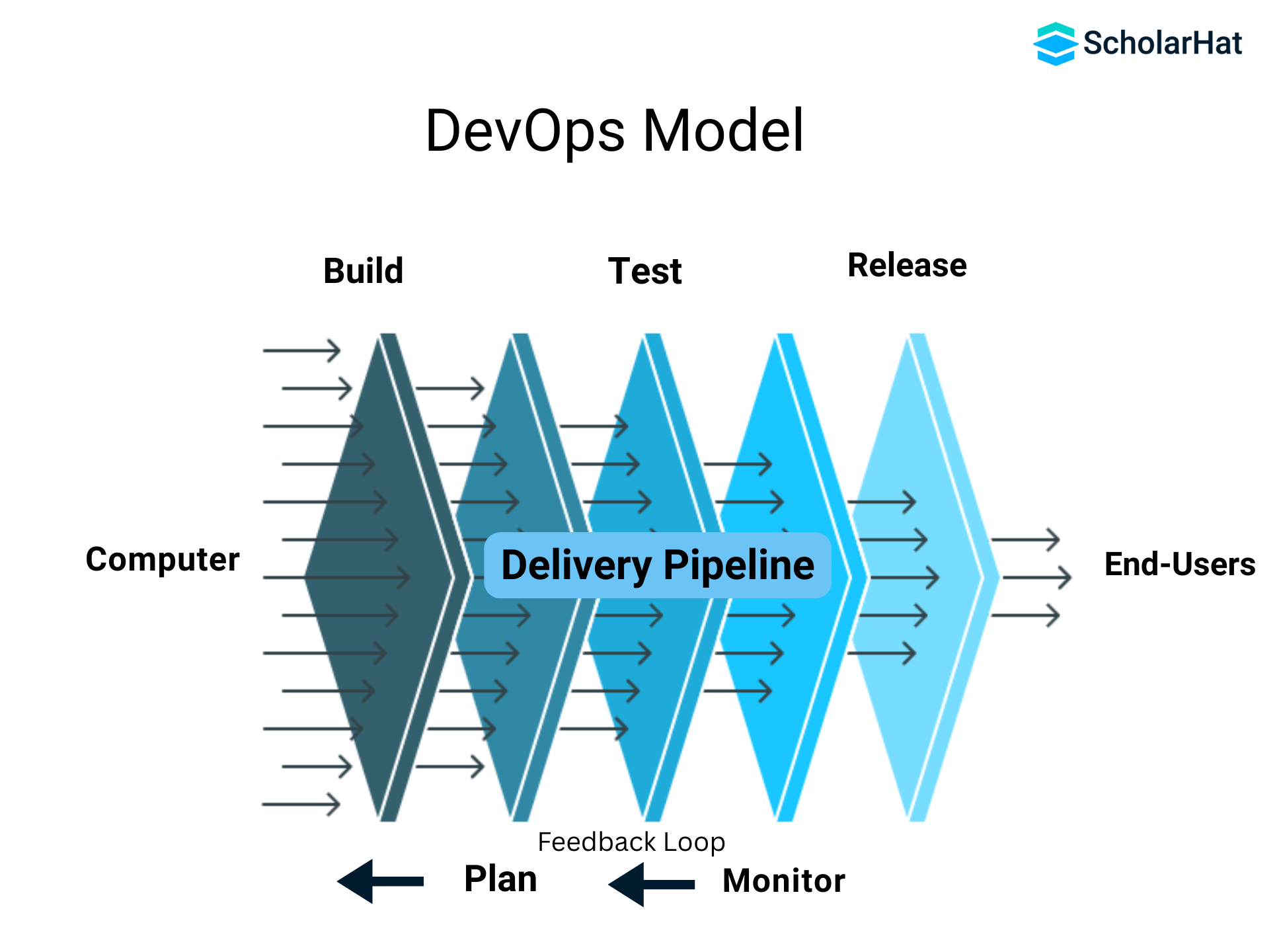
DevOps Model Defined – Delivery Pipeline
DevOps Tools
Following are the categories and Tools using which you can manage DevOps Practices.
- Planning: You can use Jira or Azure DevOps Board to manage and plan your work in an Agile way.
- Development: For code management, Git is the number 1 tool to manage your Code version History, branches, and Push and Pull mechanism in a distributed way. You can also use Microsoft TFVC (Team Foundation Version Control) which is a Centralized version control system.
- Testing: To automate your testing, you can rely on Selenium, JUnit, and Apache JMeter.
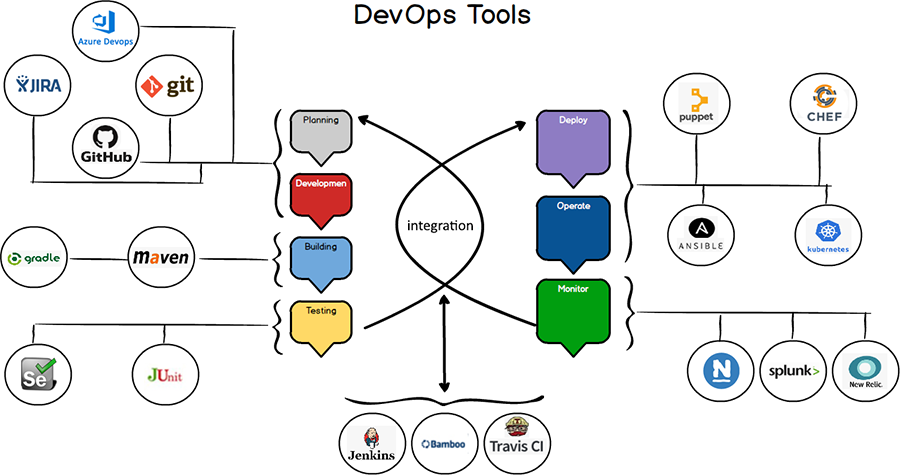
How to Adopt a DevOps Model?
How DevOps Can Benefit from AI and ML?
DevOps Engineer Job Description and Salary
A DevOps Engineer is responsible for automating software development processes, managing CI/CD pipelines, ensuring system reliability, and bridging the gap between development and operations.Key Responsibilities:
DevOps vs Traditional IT Approaches
| Aspect | Traditional IT | DevOps |
| Team Structure | Separate dev and ops teams | Integrated Dev + Ops teams |
| Development Cycle | Long and linear | Short, iterative (Agile + CI/CD) |
| Deployment | Manual and infrequent | Automated and frequent |
| Collaboration | Siloed communication | Continuous collaboration |
| Feedback Loop | Delayed | Continuous and real-time |
| Tool Usage | Limited automation | Heavy automation (CI/CD, monitoring) |
| Issue Resolution | Slower due to the blame game | Faster with shared responsibility |
Challenges While Adopting DevOps
Real-World Applications of DevOps Practices and Tools
- Continuous Integration/Continuous Deployment (CI/CD)- There are companies like Amazon, Netflix, Spotify use CI/CD pipelines that help them to make changes to their respective applications several times a day.
- Infrastructure as Code (IaC)- IaC tools like Terraform and AWS CloudFormation are widely used by companies like Netflix which help increase their scalability.
- Monitoring and Logging: Twitter uses monitoring tools such as Prometheus and Grafana that help in monitoring its microservices architecture and troubleshooting in real-time.
- Automated Testing: Automated testing is widely used by Facebook which helps them validate its mobile and web applications across several devices before it deploys the changes made.
- Containerization and Orchestration- Airbnb is the biggest real-time example that uses Kubernetes for automating the deployment and scaling of its services.
- Security Integration- Capital One uses tools like SonarQube for code analysis and AES Security Hub for continuous monitoring to enhance their security.
Advantages of DevOps
- The process of releasing Software becomes quicker, which helps large organizations to quickly respond to the growing demands of the market.
- DevOps helps in increasing collaboration between development teams, operations teams and other stakeholders.
- Automation helps in saving time and resources which lets the teams to focus more on their creativity and delivering value to their customers.
- Issues can be detected and resolved at an early stage with the help of continuous monitoring and feedback loops.
Disadvantages of DevOps
- DevOps can, sometimes, be complex to implement.
- Some team members may not be willing to adopt DevOps practices.
- Security risks could be a major problem when there is rapid deployment and automation happening.
- There are so many DevOps tools available which can lead to tooling fragmentation and interoperability.
Build, Deploy, and Integration
For Integration, we can relays on Jenkins, Travis CI, or Bamboo to manage your application builds, and based on your application need we can use Maven or Gradle for Building and accelerating development and productivity. You can also go for Docker, Kubernetes, Chef, Ansible, and Puppet which are very famous tools for deployment.
Operating and Monitoring
Once your product is in the right place, Operating and continuous monitoring play a major role here, and for that, we can use Nagios, Splunk, or New Relics. Using that one can manage Servers, Networks and Applications.
By capturing the events during the development and analyzing the system logs generated by applications, the DevOps teams can identify and understand how software changes or updates may affect end-users or the customers who are going to use the services.
Benefits of DevOps
The following are the main benefits of DevOps Practices.
1. Break down the Silos
I believe the most important benefit of using DevOps is to break down the Silos as the Cross-functional development team and operation teamwork together which is possible due to the self-organized approach to work.
2. Speed
Delivering the highest business value item quickly and faster product delivery in the market as DevOps follows Agile Principles.
Faster in pace and multiple frequent deliveries of the desired updates and features will not only fulfill the requirement of the customers but will also help your organization to take a firm stand in a competitive market.
3. Rapid Delivery
Frequently release the working product in the market to satisfy the market and more importantly customer's need, which improves the ROI (Return on investment).
4. Reliability
By following DevOps best practices and using the best tool for Continuous Integration, Testing Automation, and Continuous Delivery, and monitoring the logs helps the team to stay updated and take the real-time decision quickly.
5. Team Collaboration
DevOps improves the collaborations between the Dev Team and Ops Team, Team works together towards the common business goal. DevOps Break the silos and focus on Communication, Transparency, Inspection, Adaption, and Integration.,/p>
6. Security
While implementing automation Security is a very important factor, By Following the DevOps model and using Infrastructure as code and by doing automation of process and compliance policies, one can take control of security configuration.
7. Risk Management
Using this practice we can Identify the risk factor early in the application lifecycle stages. Early detection of any issues or bug and quick correction or fixes helps to stay ahead in the competition.
8. Software Quality
Extensive collaboration between the activities, such as product development and the operation teams and frequent collection of customer feedback may lead to a significant improvement in the overall quality of the product.
Read More:Top 50 DevOps Interview Questions and Answers
Summary
The desired practice of DevOps will encourage broader, faster, accessible, and more secure deliveries of business growth to an organization's end users or customers. Following such best practices might take the form of more frequent and parallel product releases, desired client features, or continuous updates. It can involve how quickly a product release or new feature gets into the customers’ hands, and it is possible with all the proper levels of quality and security concerns. Or, the process might focus on how quickly an issue or bug is identified, and then resolved and re-released to production. To get a strong hold on Azure DevOps, you can consider doing anAzure DevOps course from Scholarhat to elevate your skills.
DevOps is the talk of the town, but many companies or Individuals have a wrong interpretation that DevOps is a job? Or is DevOps a Software Product? DevOps is a concept with different interpretations and definitions, but when you get down to it, it's all about developers and the operations teams working together to achieve a common goal.
Get ready for 100% growth in your tech career! Our Microsoft Azure DevOps certification guarantees you the skills you need for a salary hike, job placement, and interview success. Enroll today and watch your future soar!Read More: DevOps Engineer Salary in India
FAQs
- Continuous Integration and Continuous Delivery (CI/CD)
- Automation of Processes
- Enhanced Collaboration
- Jenkins
- Docker
- Ansible
- It results in enhanced collaboration
- Continuous integration and deployment
- It improves overall effectivity with automation and streamlined processes
Take our Devops skill challenge to evaluate yourself!

In less than 5 minutes, with our skill challenge, you can identify your knowledge gaps and strengths in a given skill.

